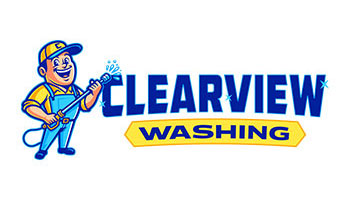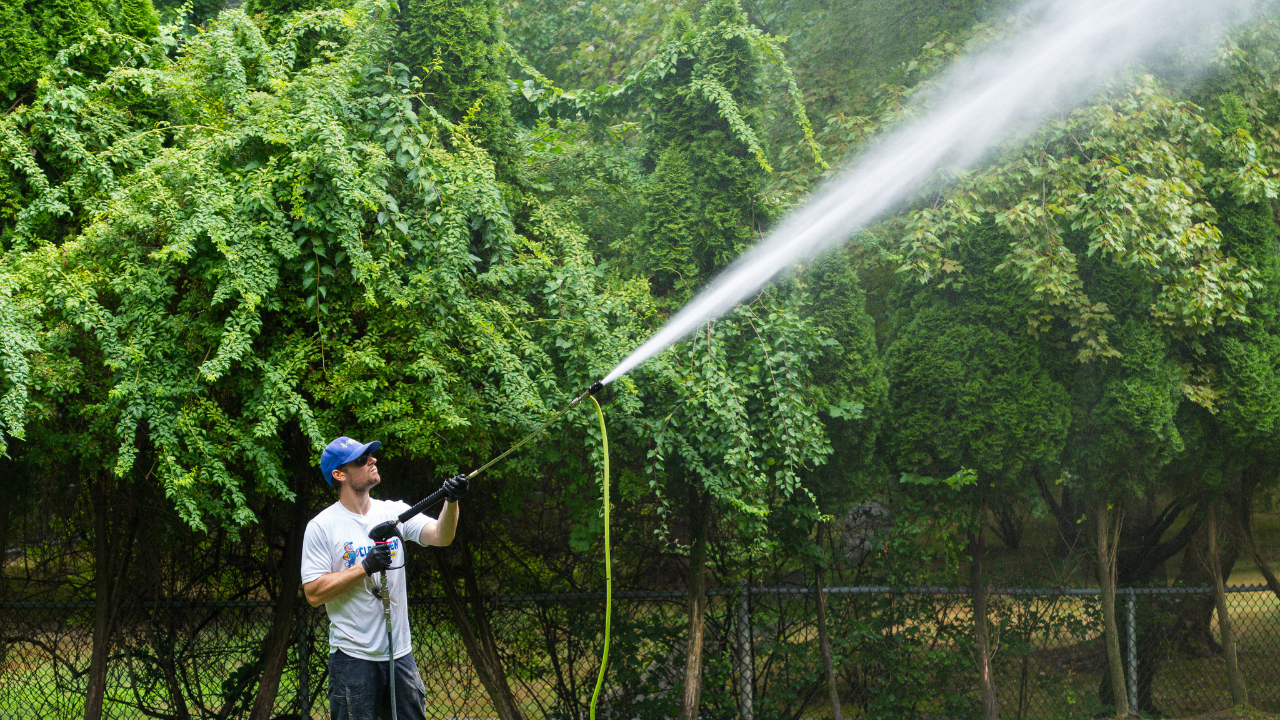Are you curious about softwashing, but confused as to what exactly it is and how it works? You’re not alone. Softwashing has grown in popularity among homeowners and business owners alike thanks to its powerful cleaning capabilities. By utilizing low-pressure rinses with specifically designed soap-based solvents, softwashing can effectively remove dirt, mold, mildew and even algae from the surfaces of your buildings. In this blog post, we’ll break down everything you need to know about soft washing so that you can make an informed decision when selecting a cleaning method for your property.
What is Soft Washing and How Does It Differ from Pressure Washing
Soft washing is a cleaning method that utilizes a low-pressure water system and specialized cleaning solutions to gently remove dirt, algae, mold, and other contaminants from surfaces. It’s an ideal choice for more delicate surfaces that could be damaged by high-pressure cleaning methods.
In contrast, pressure washing relies on the force of a high-pressure water stream to dislodge dirt and grime. While pressure washing is effective for cleaning hardy surfaces like concrete and brick, it can potentially cause damage to softer, more delicate materials such as wood and vinyl.
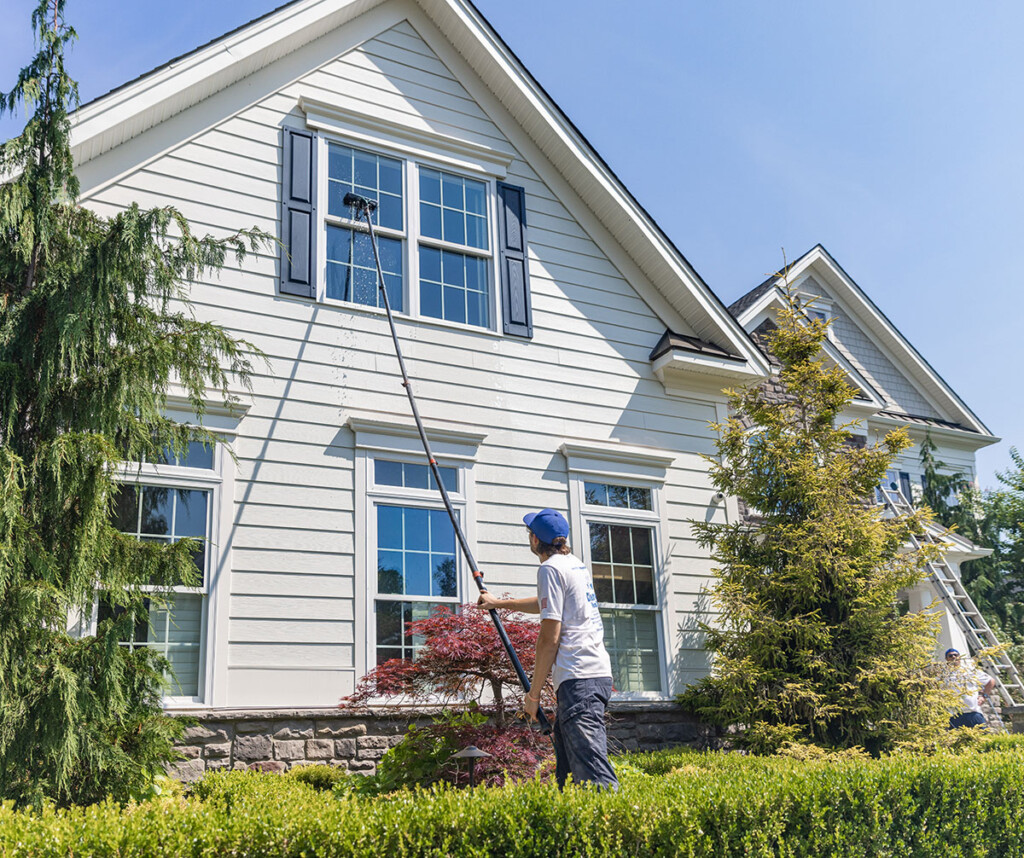
Softwashing
Therefore, the primary difference between soft washing and pressure washing lies in the pressure of the water stream used and the cleaning solutions employed. Soft washing offers a gentler yet effective cleaning alternative, making it a suitable option for a wide range of surfaces and materials.
The Benefits of Soft Washing for Your Home or Business
Soft washing holds numerous benefits for both residential and commercial properties. First and foremost, it is exceptionally effective at removing unsightly contaminants like dirt, mold, and algae without causing damage to the surface material. This is particularly beneficial for surfaces such as vinyl siding, wood decking, or rooftops, where a more aggressive approach could lead to unwanted damage.
Secondly, soft washing can prolong the lifespan of your building materials. By regularly removing harmful substances that can degrade these materials over time, you can save significant costs on repairs or replacements in the long run.
Thirdly, soft washing can improve the overall curb appeal of your property. A clean, well-maintained building is far more attractive and inviting to visitors or potential customers.
Finally, softwashing is an environmentally friendly cleaning method. It utilizes biodegradable cleaning solutions that break down over time, reducing the risk of harmful residues.
In conclusion, soft washing offers a safe, effective, and sustainable approach to maintaining the cleanliness and integrity of your property.
Preparing Your Home or Business for Soft Washing
Before the soft washing process begins, it’s important to prepare your property to ensure an efficient and effective cleaning job. Here are some tips to help you prepare your home or business for softwashing:
- Remove Obstacles: Clear the area around the surfaces to be washed. This includes outdoor furniture, potted plants, and any other movable items that might obstruct the cleaning process or get damaged.
- Cover Electrical Outlets: Protect outdoor electrical outlets and fixtures by covering them with waterproof materials to prevent water damage.
- Close Windows and Doors: Ensure all windows and doors are tightly closed to prevent water and cleaning solutions from getting inside.
- Inform Others: Notify any residents, employees, or nearby neighbors about the upcoming cleaning to avoid any surprises or inconveniences.
- Identify Fragile Areas: Point out any fragile or sensitive areas to the softwash technician before work begins to ensure these are treated with extra care.
By taking these steps, you’ll help ensure a smooth and successful soft washing process for your home or business.
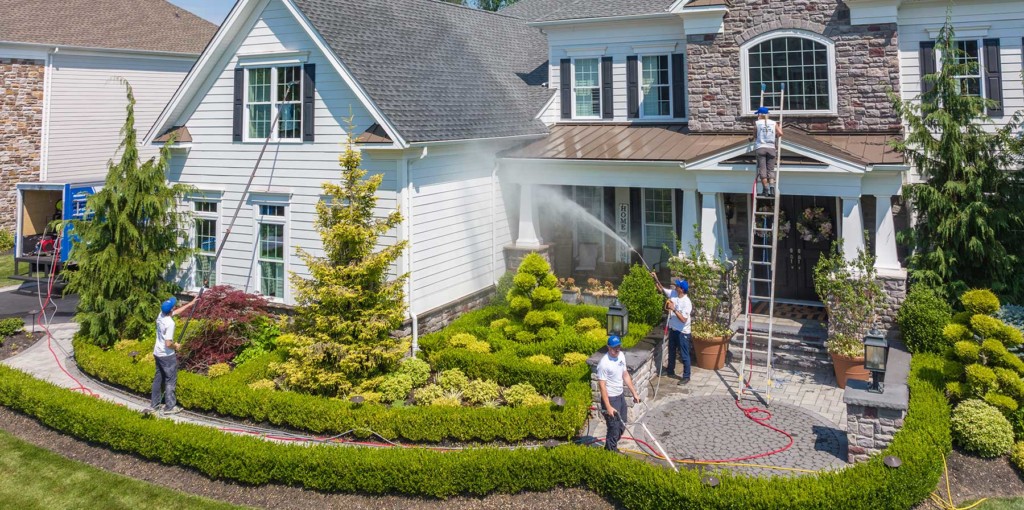
Softwashing
What Equipment is Used in Soft Washing
Soft washing involves the use of specialized equipment to ensure efficient and effective cleaning. The core component of a soft washing setup is the low-pressure washer, which is different from a regular pressure washer in terms of the level of pressure it generates. This low-pressure washer is connected to a storage tank that holds the cleaning solution.
In addition to the washer and the storage tank, a soft washing system also includes a variety of spray nozzles, each designed for different surfaces and cleaning requirements. The spray nozzles adjust the pattern and size of the spray, enabling precise application of the cleaning solution.
Furthermore, the system includes various hoses and connectors to link the equipment together, and safety gear for the operator, such as gloves, goggles, and protective clothing. This equipment ensures the safe and efficient delivery of the cleaning solution to the surfaces being cleaned.
Lastly, a softwash system may also include an X-Jet, a special nozzle that mixes the cleaning solution with water directly at the nozzle, allowing for easy control over the ratio of water to cleaning solution. This helps in adjusting the strength of the cleaning solution depending on the type of surface being cleaned.
Safety Tips to Consider When Soft Washing
While soft washing is a relatively safe cleaning method, observing these safety tips can ensure a secure experience:
- Wear Protective Gear: This includes gloves, safety goggles, and protective clothing to guard against potential skin and eye irritation from the cleaning solutions.
- Avoid Direct Contact with Cleaning Solutions: Despite most soft wash solutions being biodegradable, they can still be irritative or harmful if they come into direct contact with skin or eyes. Rinse immediately with plenty of water if this happens.
- Keep Children and Pets Away: Ensure children and pets are kept at a safe distance during the soft washing process, as the cleaning solutions can be harmful if ingested or if they come into contact with sensitive areas.
- Don’t Spray Towards People: Adjust the spray direction away from people to avoid accidental exposure to the cleaning solution.
- Follow Manufacturer Instructions: Always follow the manufacturer’s instructions when using soft washing equipment and cleaning solutions to ensure safe and effective usage.
- Don’t Softwash in Adverse Weather: Avoid softwashing during windy or rainy conditions, as the wind can spread the cleaning solution to unwanted areas, and rain could dilute the solution, reducing its effectiveness.
- Hire Professionals: If you’re unsure about any aspect of softwashing, consider hiring a professional cleaning service. They have the knowledge and experience to perform the task safely and efficiently.
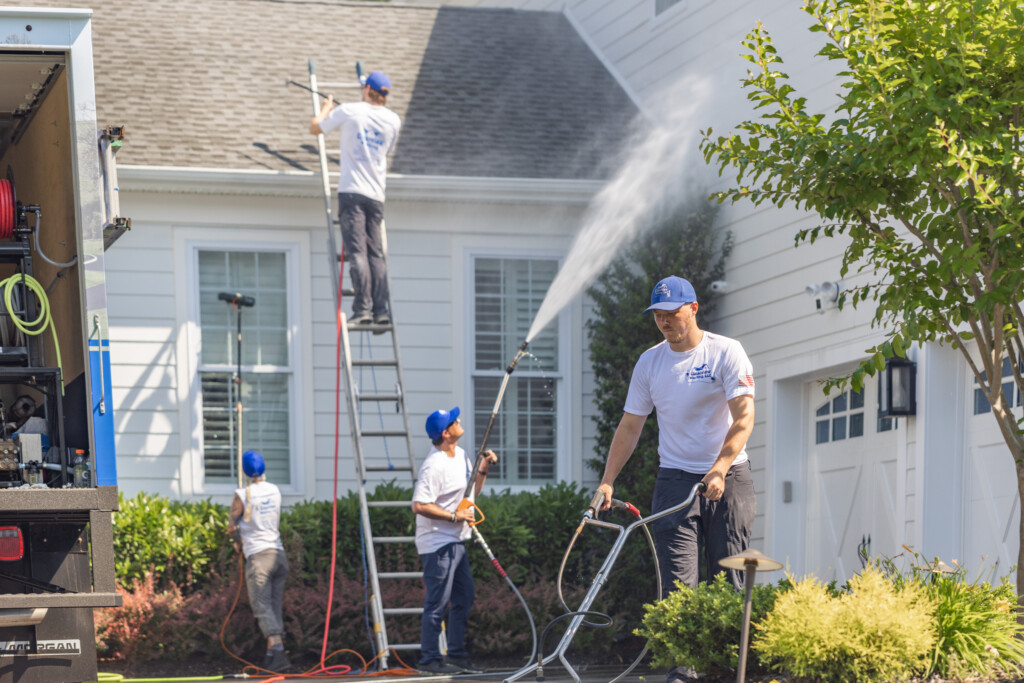
Softwashing
Maintaining the Results of Softwashing for Long-Term Benefits
Maintaining the results of softwashing is key to enjoying long-term benefits. Here are some tips to do so:
- Routine Cleaning: To maintain the clean appearance of your property, schedule regular soft washing sessions. The frequency will largely depend on your local climate and the type of materials your property is constructed from.
- Prompt Attention to New Stains: If new stains or growths appear, address them promptly. This prevents them from setting in and becoming more challenging to remove later.
- Protective Treatments: Consider using protective treatments designed to resist grime and organic growths. Consult a professional to suggest suitable protective products for your specific materials.
- Regular Inspections: Carry out regular inspections of your property. Look for signs of new staining or organic growth and schedule a cleaning if necessary.
- Proper Drainage: Ensure your property has proper drainage systems in place. This prevents water from pooling on surfaces, which can lead to quicker regrowth of algae, mold, or mildew.
By following these steps, you can prolong the benefits of soft washing and keep your property looking its best for longer.
In conclusion, softwashing is a safe and effective cleaning method that can bring long-term benefits to your property. By taking the necessary precautions and using the right equipment, you can enjoy a clean and well-maintained property for years to come. Remember to schedule regular cleanings, address new stains promptly, and use protective treatments when necessary. With proper maintenance, your property will continue to look its best and remain free from harmful organic growths. If unsure about the process, don’t hesitate to reach out to a professional soft washing service for assistance. With their expertise, you can ensure a successful and thorough cleaning of your property. Contact them to get a free quote!
